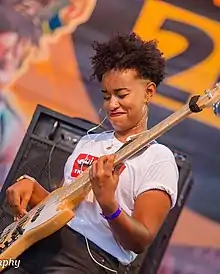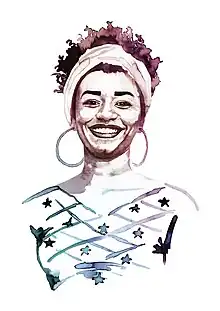Islam Elbeiti
Islam Elbeiti (born April 3, 1994 in Khartoum, Sudan) is a Sudanese bass player, radio presenter, and social change activist.[1][2]
Islam Elbeiti | |
|---|---|
| إسلام البيتي | |
 Islam Elbeiti at Sauti za Busara 2021 Festival in Zanzibar | |
| Born | April 3, 1994 |
| Nationality | Sudanese |
| Education | University of Medical Sciences & Technology, Khartoum |
| Musical career | |
| Genres | African popular music |
| Instrument(s) | Electric bass guitar |
| Years active | 2013–present |
| Website | islamelbeiti |
Early life
Elbeiti was born in Khartoum, the capital of Sudan, as the eldest of five children, one brother and three sisters. She grew up in Sudan, Ethiopia, China and the Democratic Republic of Congo (DRC).[3]
Musical career
Elbeiti plays jazz, reggae and Afro-pop in different bands on the electric bass guitar. In December 2017, she contributed to the music and arts department of the first edition of Karmakol International Festival, which was held in the village of Karmakol in northern Sudan. This festival was organized by civil society groups to showcase Sudan's rich contemporary culture and attracted both Sudanese and international visitors and artists.[2] Elbeiti also performed live on stage with the well-known UAE-based Sudanese singer-songwriter Nile.[1]
In 2021, Zakia Abdul Gassim Abu Bakr, the first female guitarist in Sudan and wife of Sharhabil Ahmed, announced the forthcoming release of an album by her all-women's band Sawa Sawa, including Islam Elbeiti.[4]
Education and professional activities
Elbeiti graduated from the University of Medical Sciences & Technology (UMST) in Khartoum with a Bachelor's degree in business administration and management. She was also a radio presenter at Capital Radio 91.6 FM in Khartoum for a show called "Jazzified", where she talked about jazz-related topics.[5]
Social activism

Islam Elbeiti has led and participated in several projects that have propelled entrepreneurship and cultural industries in Sudan and beyond. Islam's experience ranges from co-founding the first Sudanese entrepreneurship and innovation network for promoting the development of informal music education in Africa through the Global Music Association. She is the co-founder of the Sudanese Innovative Music Association.[6]
Further, she works as a cultural consultant and project manager for CEEZ (Creative Education and Empowerment Zanzibar). In addition, she is a member of the Pan-African Policy Innovation Foundation, which focuses on democratic political reform.[6]
As part of her activities in civil society, she has been a Program Manager at the global network Impact Hub in Khartoum.[7] She is also a member of the i4Policy Task force, an organization that works in democratizing policy-making with specific emphasis on entrepreneurship.[8]
In 2017, she gave a talk on a TEDxYouth event in Kinshasa, in the form of a spoken word poem entitled Don't Kill Them.[9] In August 2019, Elbeiti was nominated by the British Council in Sudan as 'Artist of the Month", both for her activities as a musician and for her involvement in civil society.[7]
See also
References
- "Islam Elbeiti: A Jack of Many Trades". 500 Words Magazine. 8 November 2018. Retrieved 10 December 2018.
- "A Sudanese bassist for change". CNN. 29 March 2018.
- "Bringing African Women Hope Through Music. (Part 1) Islam Elbeiti". www.yamaha.com. Retrieved 9 June 2020.
- "Interview with Sudan's first professional woman guitarist: 'the Ministry of Culture neglects Sudanese art'". Radio Dabanga. Retrieved 1 August 2021.
- "Sudanese jazz musician says young women like her are driving the country's 'revolution'". The World from PRX. Retrieved 15 April 2021.
- "Islam Elbeiti". Music In Africa. 18 July 2022. Retrieved 12 October 2022.
- British Council Sudan (August 2019). "Artist of the Month: Islam Elbeiti - August 2019". sudan.britishcouncil.org. Retrieved 21 April 2021.
- "Home - i4Policy". i4policy.org. Retrieved 12 October 2022.
- Elbeiti, Islam (15 June 2017). "Don't kill them". YouTube. Retrieved 10 June 2020.